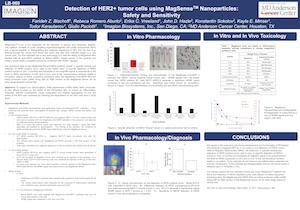 Pre-clinical data on Imagion Biosystems’ MagSense HER2+ cancer detection platform have shown:
Pre-clinical data on Imagion Biosystems’ MagSense HER2+ cancer detection platform have shown:
- specific binding and detection of HER2+ tumor cells in vitro
- specific detection of HER2+ tumors in vivo
- binding and amplitude of magnetic signals proportional to HER2 expression in vitro and in vivo
- stability of the anti-HER2-nanoparticle construct
Recently, Imagion Biosystems conducted initial studies to assess nanoparticle construct safety. Data from these studies were presented at AACR 2018, the annual meeting of the American Association for Cancer Research, held April 14-18 in Chicago.
In-vitro efforts focused on the ability of the PEGylated nanoparticles to induce an inflammatory response, activate complement, cause coagulation and platelet aggregation. In-vivo, the degradation of the nanoparticles over time was followed in NSG mice.
Observations from these studies indicate:
- the nanoparticle constructs do not induce a pro-inflammatory response nor activate complement
- the particles are biodegradable and do not induce acute or delayed signs of morbidity in vivo.
The authors conclude,
Our results support the first intended clinical use of the MagSenseTM platform for the in vivo detection of HER2 amplified tumor cells. Based on these supportive preclinical data, the MagSense Anti-HER2 NPs are being produced under cGMP along with an R&D version of the MagSense device, for an early stage research clinical trial.
Download Detection of HER2+ tumor cells using MagSense® Nanoparticles: Safety and Sensitivity (4.1 MB pdf)

